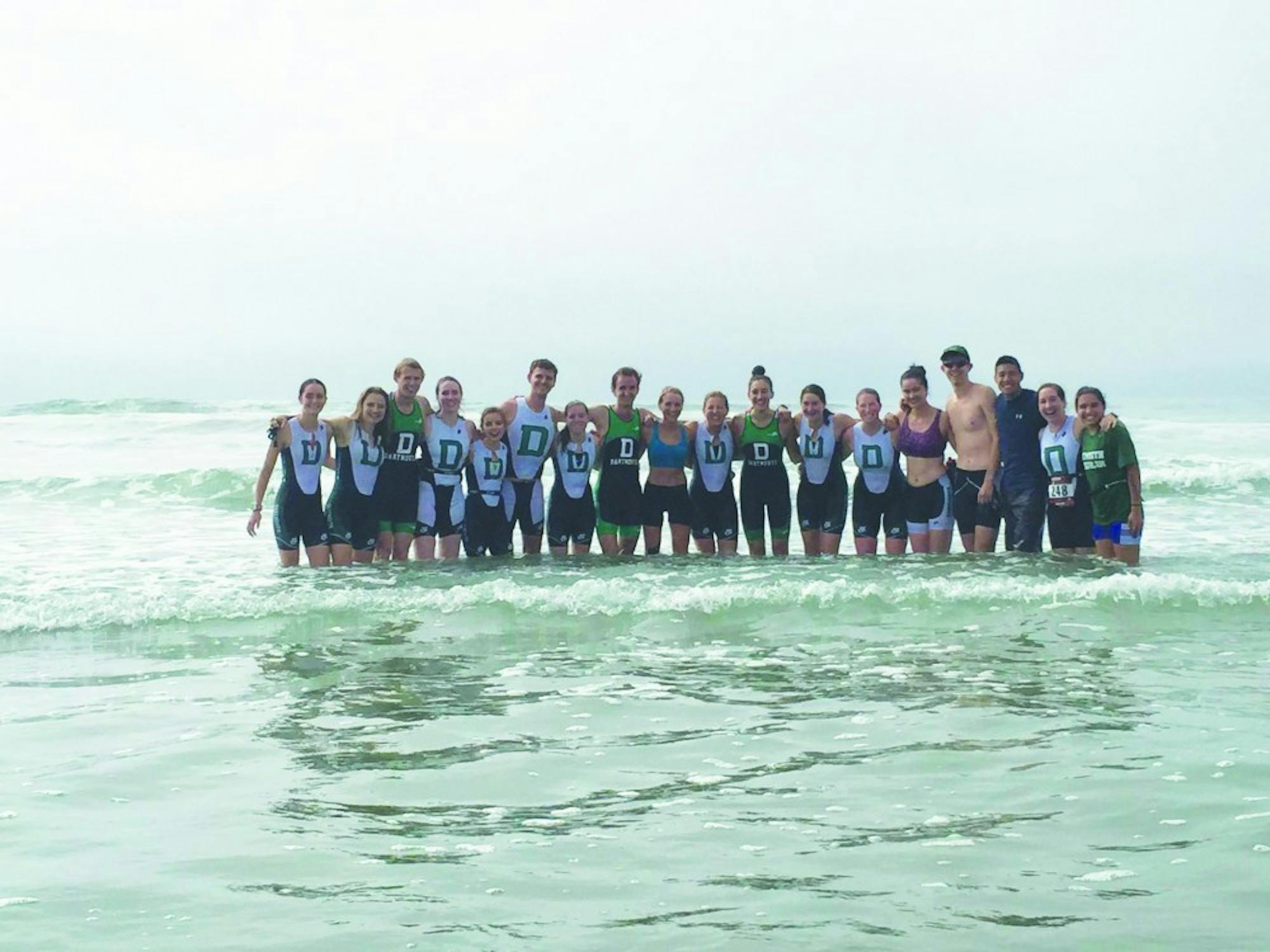Founded in the fall of 2013 by former members of the women’s swimming team Kendall Farnham ’14, Nina Mascia ’15 Med’21 and Sara Heard ’15, the Dartmouth triathlon team has grown from a small team on a shoestring budget to a team with approximately 30 members, boasting competitors who have excelled at the national level. Katie Clayton ’18, Emma Sklarin ’18 and Sonia Rowley ’19 finished in the top 25 of the women’s 20-24 age group at the USA Triathlon national championship in August and are qualified to race at the 2018 International Triathlon Union World Triathlon Grand Finale in Gold Coast, Australia.
The team currently includes three co-captains, three coaches and a 14-member executive board. When she started the team, Mascia wanted to create a team that could excel in athletics but also be dedicated to supporting each other and building a community.
“We had people come that could not swim one lap and people who were varsity-level athletes — we all came together toward the same goal, which was really cool,” Mascia said. “And I think [that is] exactly why we started the team, to just have that atmosphere where you can work together.”
After a summer training trip to co-captain Clayton’s Maine home during the first week of September, over 20 members participated in the Max Performance Buzzards Bay Triathlon, the team’s first race of the term, on Sept. 17. The group took second place overall, with Rowley taking second across all female age groups.
The team faced administrative difficulties when it began, according to Mascia, as previous failed iterations of triathlon teams had made the school hesitant to offer its support. Triathlon also requires significant resources, as triathletes must have triathlon bicycles, wetsuits and running shoes — not to mention the entry fee for each race, which can range from $80 to $100.
“We started out with only $400 in our bank account and kind of panicked because that’s not a lot of money,” Mascia said. “So we set our dues, and we were lucky enough to have a lot of members to kind of build our funds and then we were just smart about money.”
The team took advantage of the spin room and swimming pool and, after a year of careful budgeting, received matched funding from the College.
“We didn’t want finances to be an obstacle for anyone who wanted to race,” Mascia said.
One of the major changes that happened to the team, according to Clayton, was doubling the number of practices from two or three sessions per week to five or six. Many of the members wanted to try longer races and the new rigorous practice schedules were reinforced by coaches Jim Anderson and Jeff Reed ’76, who both joined the team in 2016 and enriched its training with years of experience. According to Clayton and team executive board member Sklarin, the coaches were especially helpful in motivating team members, assigning specific training schedules every day and assisting with transitions from one segment of the race to the other.
Although the team has expanded its goals from sprint races to Olympic-distance races and half-Ironmans, it remains accessible to athletes of all ability levels.
“It’s open to everyone, even if you’ve never ran or swam or biked before — that’s why I love it,” said Hunter Dominick ’20.
The team focuses on achieving individual objectives alongside the team goal of helping “everyone reach the levels that they are looking for and improve,” Clayton said.
While triathlon, a strongly individual sport, can be isolating, team members say the supportive and welcome environment makes training enjoyable.
“I wouldn’t do this sport if I didn’t have a team to do it with,” Clayton said.
The team dynamic, as a result, is “hard-working but fun-loving,” Sklarin said. Members work out six days a week but also host weekly team dinners and travel to races together. The Buzzards Bay race last weekend showcased the team atmosphere.
“We all came home, and we were sore because our legs were tired but our throats were also sore because we were screaming so loudly for each other,” Clayton said.
Co-founder Mascia said that the team has thrived due to the persistence of its members. She has returned to campus after two years to pursue her medical degree and was able to watch the team grow.
“I’m so proud of them because that’s exactly what I wanted for them, to build this into something that could last and keep mentoring new future leaders of the team, and keep inspiring them to want to be a part of it and to love triathlon because that’s really what it’s all about,” Mascia said. “It’s such a cool sport, and anybody can do it … it just takes a little hard work sometimes.”
Hye Young is an exchange student from Seoul, South Korea. Hye Young is majoring in comparative literature with a focus on postcolonial literature, and joined the D partly because of her love of news recaps by late night show hosts. When she isn’t struggling to keep deadlines for essays and overanalyzing literary texts, Hye Young likes watching movies and going stargazing.




